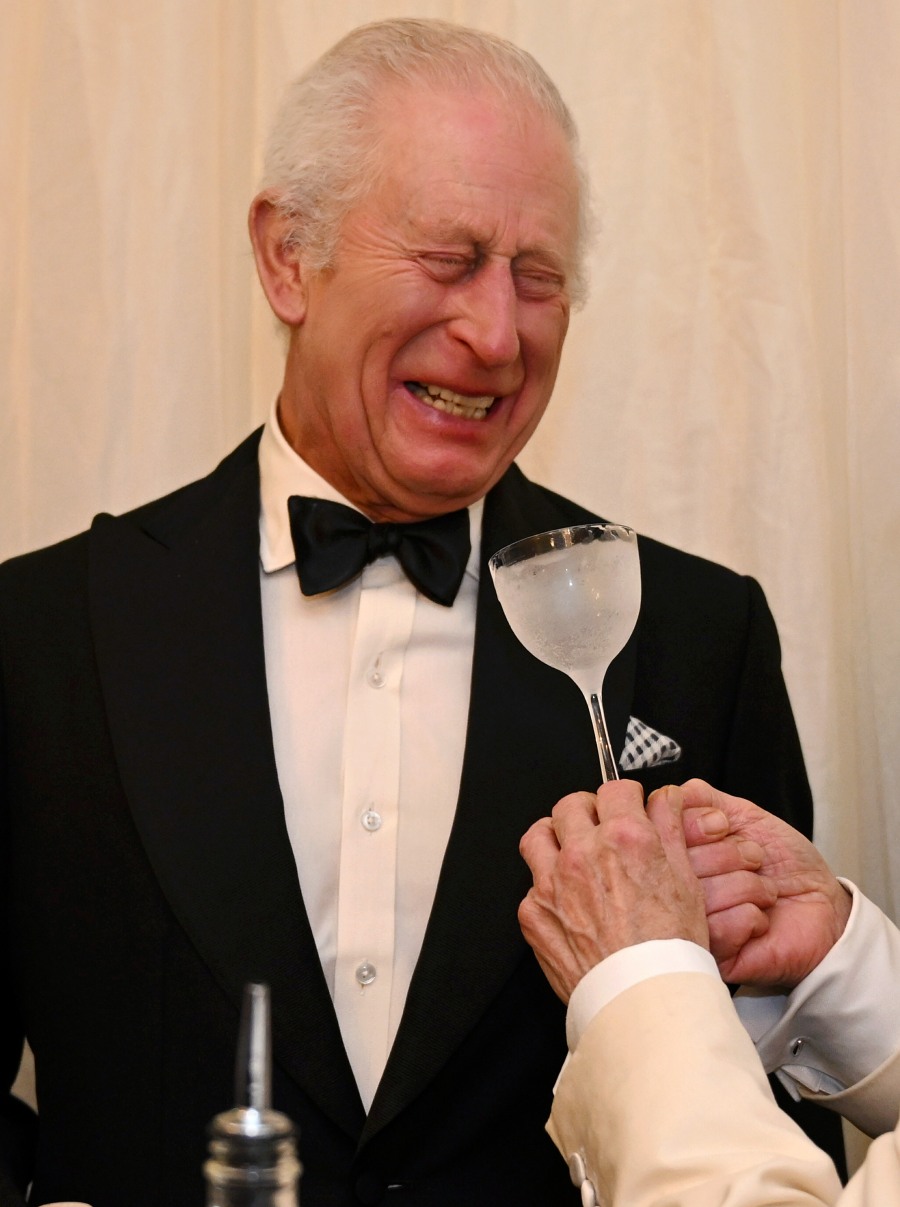There certainly is a lot of rancour behind-the-scenes within the left-behind Windsor clan. That’s something which has become more obvious in recent years – the British media’s obsession with the Sussexes obfuscates the larger dysfunctions between King Charles, Queen Camilla, Prince William and the Princess of Wales. It feels like Kate skipping Royal Ascot so suddenly last month had repercussions – Charles’s rep met with the Sussexes’ rep and the whole thing was announced during Wimbledon’s championship weekend, much to William and Kate’s dismay. The Waleses have received a lot of negative press (couched in Sussex-mockery) and William even got tagged in Princess Anne’s birthday article. So the Waleses are fighting back? The Sunday Times had a lengthy piece about how King Charles’s Highgrove estate has lost 11 out of 12 gardeners in the past few years, and Charles is a terrible boss who makes gardeners cry. Some highlights from the Times:
How King Charles still exerts so much control over Highgrove: In summer 2021, Charles signed a deal to preserve his influence over the property when he became King, a legal and technical necessity as it was due to be inherited by his son, William. Since then, he has remained involved on the most minute level, supervising everything from the size of peaches to the shade of roses. He does this by attending walkabouts at the property, then sending notes in thick red ink to garden staff who are expected to act before his next return.
The memos: The memos are often strikingly specific and emotional — demanding, for instance, that staff move a single, unacceptable ragwort from the perimeter of his swimming pool; telling them their failure to cultivate his beloved delphiniums had caused an almighty disappointment and spoilt one of his favourite moments of the summer; and even correcting grammar.
Charles is aware of the problems: In the background, the King has entrusted a manager to become his go-between with the gardeners, many of whom say his requests are impossible to fulfil given the lack of resources. Others have complained of poor conditions, including pay as low as minimum wage. Charles is shielded from some of the issues, but not all. He was sufficiently aware of staff problems that, after the invasion of Ukraine, he dashed off a note proposing that war refugees could be recruited to help out. Of 12 full-time gardeners employed in 2022, 11 have left, including two heads of gardens and a deputy head gardener who departed within the space of a year. One had served the King for decades. Another failed his probation after revealing a lack of knowledge about a particular flower, instantly losing Charles’s trust. The monarch said of him: “Don’t put that man in front of me again.”
Gardeners’ complaints: In late 2023, one staffer launched a grievance against the gardens’ management, saying the team was overwhelmed, under-resourced and constantly struggling to fulfil the King’s requests. His complaint said staff had developed physical injuries trying to keep up, and that the team suffered from low morale. It added: “There is little management of HMTK [His Majesty the King’s] expectations, and I know I would not be allowed to say we are understaffed.” In turn, The King’s Foundation, which now runs the gardens, commissioned an external investigation. It found evidence of “staff shortages” and “poor” management practice; that pay was an “issue for recruitment and retention”; and that churn was so severe the gardens had been given “carte blanche” to hire temporary workers. It recommended “management training for all managers”, “mental health support and counselling” and a pay review. Yet insiders say issues have persisted.
Charles can’t retain gardening staff: Charles’s charity has done away with the title of “head of gardens”, appointing only a “head gardener” after successive departures, and removed the role of deputy head gardener. Two more staff walked out around the start of this year. In turn, the gardens have continued to rely on staff sent from Charles’s other estates, as well as career-changers and local volunteers.
The deal Charles created to keep Highgrove when he became king: To preserve his access to the place he loved, Charles created a new company, Highgrove Nominees Limited, which had one shareholder: “His Royal Highness Charles Philip Arthur George The Prince of Wales.” He entered into a 20-year agreement to rent the estate through the company. His landlord: the Duchy of Cornwall, which, under his control or his son’s, would have to honour the deal. The price agreed was £340,000 per year. As a result, Charles could keep the residence, a balustraded manor built in the 1790s, until the age of 92, while subletting the gardens to The Prince’s Foundation (now The King’s Foundation), which would oversee their day-to-day management while he attended to royal duties. It would also raise funds through an expanded offer of tours, classes and branded goods, making Charles less reliant on wealthy individuals for potentially embarrassing donations.
Why there are so many problems: Some point to Charles’s meticulous approach. They acknowledge that many find his passion inspirational or endearing, but say his feedback — the flashes of frustration, the specificity — can be demoralising and, given his unique status, impossible to object to. Others talk about Constantine Innemée, the executive director of Highgrove and one of Charles’s most trusted advisers. Under his leadership, staff are told to prioritise Charles’s wishes — even if they seem impractical. According to the 2023 grievance, on one occasion Innemée “shouted at” one gardener who had sought to tell the King about staffing issues. Innemée insists he was being “firm”, and the grievance report made no finding on the matter. Low pay is a running sore, with wages poor even by industry standards. At times as many as half of the garden’s employees have been paid minimum wage. Charles is aware of the churn. Yet the monarch’s determination to realise his vision has remained undimmed.
Charles’s meticulous standards: As he prepared to ascend the throne, and then as monarch, Charles was busier than ever. But he continued to exercise strict control over the gardens. He did so through morning walkabouts supervised by Innemée and attended by a selected gardener. Hands tucked behind his back, he ambled from plant to plant, issuing instructions to be written up and acted on before his next return. In between visits, gardeners were to send detailed updates, which had to comply not only with precise botanical standards but also grammatical ones. Memos were to be addressed to “YRH” (Your Royal Highness) and later “YM” (Your Majesty) and avoid phrases Charles saw as improper. In turn, Charles responded with his characteristic handwriting on thick paper cards. Why were the name tags missing from his favourite magnolia? Why had the gardeners failed to save his beloved evergreen azalea? Why was a particular cherry tree failing to grow? Why had the delphiniums been cut back when doing so would harm their progress — and, for that matter, were they being fed enough seaweed, in line with his instructions?
Charles’s lack of respect: At times, Charles struggled to contain his frustration, asking staff why his acers had been left in a disgraceful state, or why they had failed to find a pink version of a cornus as requested. When one staffer misspelt the name of a Japanese deciduous shrub, he underlined the incorrect letter and sent a two-lettered objection: “No!” One gardener said staff were treated like “dirt”, adding: “There was anger boiling at the surface … very impatient, no politeness at all.” This person said the King’s position made it impossible to speak up: “It was like, you should be thankful that we’ve given you a job, and you work for the King, the highest person in the country.”
The pay is horrendous: By March 2022, out of 12 staff, three were on an hourly wage of £8.91, the minimum wage; two were on £9.50, the minimum wage for the following year; and one, a student, was on £8.36. Innemée did permit modest pay increases for some of the replacements, but sources say gardens elsewhere remained more competitive. One source said low pay was a “notorious” fact of royal life and a sacrifice people were willing to make because of the “kudos” on one’s CV. Yet in the modern era, and with staff now answering to a charity, not the household, fewer appeared willing to tolerate it.
Charles’s answer to staff shortages: Charles was, at the least, aware of the staffing shortages. He proposed remedying them with elderly volunteers, who he said had done a terrific job at Ray Mill, his wife Camilla’s home in Wiltshire, or refugees from the war in Ukraine. The estate duly put out a call to “local green-fingered enthusiasts” who could “play their part in caring for our green space”. In keeping with Charles’s suggestion, Highgrove said it was specifically searching for “semi-retired and retired men and women”. The King would be updated on individual staff departures and where they were leaving for. By August 2023, one senior gardener had had enough, submitting a grievance claiming that: “There is little management of HMTK expectations, and I know I would not be allowed to say we are understaffed. I once gave advice regarding a staffing requirement for propagation and I was shouted at by [Innemée] and reprimanded after the walkabout. There has been an ongoing issue with staff shortages and this has created negativity and low morale within the team.”
But 5 am emails, amirite? Once again, it turns out that everything they accused the Duchess of Sussex of, they themselves were doing. It was all projection. Charles’s gardening staff turnover is insane and it speaks to the dysfunction at the heart of Charles’s operations, his foundation and his pseudo-private estate. As for the actual problems, this is not rocket science. The answers to these dilemmas are pretty easy, to me at least. Charles and his foundation need to pay the gardeners much higher salaries and Charles needs to be told that he cannot treat people this way. It’s absolutely bonkers that they’re trying to get Ukrainian refugees and retired seniors to look after a for-profit garden instead of just… hiring the best gardening staff possible and paying them competitive wages. And don’t send them rude memos every single day.
Photos courtesy of Cover Images.









